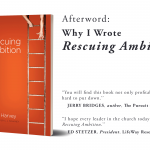In anticipation of Easter, I want to explore the revelation John received as he went to worship on the Lord’s Day.
John worshipped, Jesus appeared, John collapsed.
Christ revives John and then gives him a revelation – thus the title of the book – of the present age and the end of the ages.
As we hop into John’s vision, keep in mind that what the apostle sees is not a literal report from the future. It’s not as if a paper boy tossed a futuristic newspaper across time to land on John’s doorstep.
No, the Book of Revelation has seven sections that symbolically describe the Last Days – the period between Christ’s first coming at Christmas and his second coming on the Day of Judgment. Each of these seven sections run parallel to one another. And each section takes a deeper dive into the Last Days events. Think of it as seven different camera angels shooting the same scene. Each offers a different perspective on the history, and each progressive scene ‘zooms in’ a little more.
The Lamb Is the Answer
In Revelation 5, John has been escorted—as a guest—into heaven’s throne room immediately after the crucifixion.
One commentator describes it like this: “John is summoned to the control room at Supreme HQ.” (The Message of Revelation by Michael Wilcock) What he sees there is an angel posing a question—proclaiming it really—for all of creation: “Who is worthy to open the scroll and break its seals? (v. 2)”
You have to understand—and I’ll get into this more in a moment—that this old scroll tells everything about the history of the world—past and future. God wrote all these things down, and then he closed the book and sealed it shut with seven seals.
The one who can open this scroll is the Lord of all history. So, the angel isn’t just looking for any old fool with a box-cutter who can slice open his package. No, he’s asking: “Who is qualified for this epic task of opening the scroll? Where is the One who has upheld all of God’s laws and earned the approval of heaven? Who is the conqueror who can vanquish the universe’s most diabolical enemy?”
At that moment, all of heaven turns its gaze to the answer. They turn their heads and find themselves staring at—are you ready for this—a solitary lamb (v. 6).
On the Topic of Lambs
Now, concerning lambs. They are not exactly what comes to mind when one ponders triumph, power, and success.
When nations want symbols of potency and power, they look to mighty beasts and birds of prey—the USA has an eagle; the Russian’s a bear; Korea has a tiger; the British a lion. I mean, professional sports teams are never named after sheep.
Could you imagine The Fighting Lambs running across the gridiron? The Thundering Lambs winning an NBA championship? There’s just nothing you could do to that animal to make it look menacing. Muscles and tatts would not help. There’s just no glory or strength in a lamb’s life.
Yet the Lamb is the central character of John’s vision.
Only an other-worldly kingdom would dare use a lamb as a symbol of triumphant victory! That’s why the answer to the central question of this chapter is the lamb. And here we discover that “the Lamb is worthy.”
But why is he worthy? What is he worthy to do?
Let’s back up for a moment to understand the significance of the Lamb’s appearing.
No One Is Righteous
In the right hand of the Father is a scroll. The content of this scroll is so important that the inability to look at it reduces John to despair (v. 4). The mere thought of it remaining unopened crushes John.
This scroll contains God’s redemptive plan, the fullness of his purposes for judgment and blessing. This is the world’s destiny. BUT it’s bound and cemented shut, barring redemption from being accomplished.
John weeps, because he longs for someone worthy to approach the throne and break these seals. He longs for the story of redemption to find its fulfillment in a Savior. But none are worthy.
The scene freezes in this moment – a divine crisis finding expression in John’s despairing cries. All of history hung in the balance, and it appeared that no one could help. Not Abraham nor Isaac, Moses, David, or even Solomon in all of his wisdom. Creation is cursed.
This moment in heaven corresponds to that time of indescribable darkness on Good Friday when the Father turned his face away from the Son. In that moment, even Jesus was no longer worthy, because of the sin that had been laid upon him. In that moment, the Father crushed the Son with inextinguishable anguish and desolation.
Here, John’s vision touches the gloom of life outside of God, a life lost in sin. And, of course, John despairs. There appears to be no future. No plan. No vindication of God’s holiness. And no salvation. Only silence and utter darkness!
A Personal Revelation
I remember a period in my life where I grew in awareness that no matter how hard I tried, I could not be righteous. I had believed in God from an early age, but I thought this just meant trying harder to be good. But working harder and being good always seemed out of reach. It dawned on me that I’d never be good enough. On my best days, I fell short of God’s standard. I certainly couldn’t break the seals.
It wasn’t until college that someone showed me how Jesus’s life and death solves the largest problem creation ever confronted. I’m not talking about global warming, a nuclear armed Korea, or rigged elections. No, this is the problem John wept over. How can a sinful man approach a holy God? Who in the cosmos possesses the qualifications to approach God’s throne, take the scroll, and break the seals? Is there one in all creation who is worthy?
The Lamb is Worthy!
This is where the vision takes such an extraordinary turn. There’s an announcement in heaven. A voice pierces John’s despair with words that can scarcely be believed. “Weep no more!” There is One worthy to open the scroll, to break the seals, to conquer sin and death. The history and destiny of the world was foretold as the Lion of the tribe of Judah (Gen. 49) and the root of David (Is. 11). Now, he’s here. John’s head snaps in the direction of the voice, prepared to behold a great, conquering lion who would destroy his enemies and establish his kingdom by force.
But what does he see? Jesus Christ has come! But he doesn’t look like a warrior. John sees the Lamb, as though it had been slain. But get this! He’s standing.
The Lamb is not dead, fallen, or defeated. He is risen and alive. He’s conquered death. Now he stands with seven horns – he’s perfect in power – and seven eyes – he’s perfect in knowledge.
He ALONE is qualified to approach the Father and take the scroll. The Lamb has conquered death, so the Lamb is worthy (Rev. 1:18; 2:8).
Theologian Graeme Goldsworthy describes it this way:
By a skillful use of apocalyptic images, John illuminates the central paradox of the gospel. The victory of God was the humiliation and death of his Son. The Lion assumes the meekness of the Lamb and dies in order to overcome.
John looks and can scarcely comprehend the extraordinary news. The plan has worked, the tomb is empty, the Champion has been raised. The resurrection has succeeded!
Who is Worthy?
In that moment, John saw what many miss. I once read an article in USA Today that was entitled “To hell with sin when being good is enough.” This captures the assumptions and value system of the modern mind. “I’m good enough for God. I’m better than some, not as good as others, but good enough to spend eternity chilling with God.” But it’s a lie.
No one is worthy to be a guest in heaven. That’s why John wept. He wept because we’re not good enough. No one could approach the throne. No one could take the scroll and break the seals. “None is righteous, no, not one” (Rom. 3:10).
That original question in heaven frames life’s biggest problem—our biggest problem. Who is worthy? The answer is NO ONE!
You may have good days, but the standard for seal breaking is perfection. All have sinned and fallen short of God’s glory (Rom. 3:23). We need someone else to go into the throne room. We need a substitute – a Lamb – to take our place.
The Epic Pass
Few can talk about this year’s Super Bowl without thinking of Nick Foles. The second string quarterback came in at the end of the season to lead the Eagles through the playoffs and then to an unexpected Super Bowl upset. The ‘Philly Special’ play, where running back Trey Burton took the snap and actually threw a touchdown pass to Foles, will be talked about for decades to come.
That pass was splashed all over the internet. Social media exploded. There was pandemonium in Philadelphia (and in our house in Naples!). Why? Because a historic pass was made under indescribable pressure to basically lock down a victory.
Revelation 5 records the ultimate game with a far more historic pass – the Father passing the scroll to the Lamb. In that moment, heaven gets it! They understand the significance of the moment. They comprehend the meaning of this epic pass. When the Lamb takes the scroll, God’s wrath is appeased.
The Lamb’s sacrifice is sufficient.
His people are redeemed and their future is secure.
Though we were unworthy and sinful, there was a pure and sinless One who stepped forward. He took the punishment we deserved as sinners. Then, he rose from the grave and gave us the placed he earned for us through his obedience.
The crucified lamb won eternal victory!
Explosion of Praise
If you’re having a hard time knowing how to respond to this incredible Easter news, think about how you respond when your team scores that winning touchdown. And take a look at heaven’s response. They celebrate and sing! There is an explosion of praise that would make the crowd noise at the Super Bowl seem like a whisper. And this is the focus of their song:
“You are worthy to take the scroll
and to open its seals,
because you were slain,
and with your blood you purchased for God
persons from every tribe and language and people and nation.
You have made them to be a kingdom and priests to serve our God,
and they will reign on the earth” (vv. 9-10).
If you look closely at the text (v.8-13), you’ll see a crescendo of praise that sweeps outward in concentric circles. It starts with the elders and four living creatures. Then, it adds the voice of many angels. Finally, it climaxes with every creature on earth and under the earth and in the sea.
All are united in their praise because the “scroll-pass” was completed. The Lamb is risen! His work is worthy, and those he has purchased from every race will finish the course and ultimately join their voices.
Revelation 5 starts with darkness before the resurrection, but it ends at the end of time where all of God’s people – black, white, Asian, Latino – will be united in adoration of the Lamb. If you’ve trusted in the Lamb’s death as the only way to the throne, you’ll be in that group for eternity.
Pastors: Look to the Lamb!
So, pastors, as guests enter our churches for Easter looking for a memorable service, tell them about the one answer that will unlock any concern they can bring into the pew.
If they are tired, the Lamb is worthy.
If they are suffering, jobless, have rebellious children, the Lamb is worthy!
For sinners who have done unworthy things just the night before, the Lamb is worthy, and his death covers their sins.
For those who feel too ashamed to identify with Christ, the Lamb is worthy.
They need to know that because the scroll has been passed, Jesus identifies with them.
Pastor, do you feel unworthy to finish the race, the Lamb was worthy to take the scroll and lock down your future. Don’t weep like John. Look to the Lamb! That is real point of Easter Sunday.
John learned that seeing the Lamb created a memorable meeting. If you want a great Easter, look and see the Lamb. Because he is worthy!












